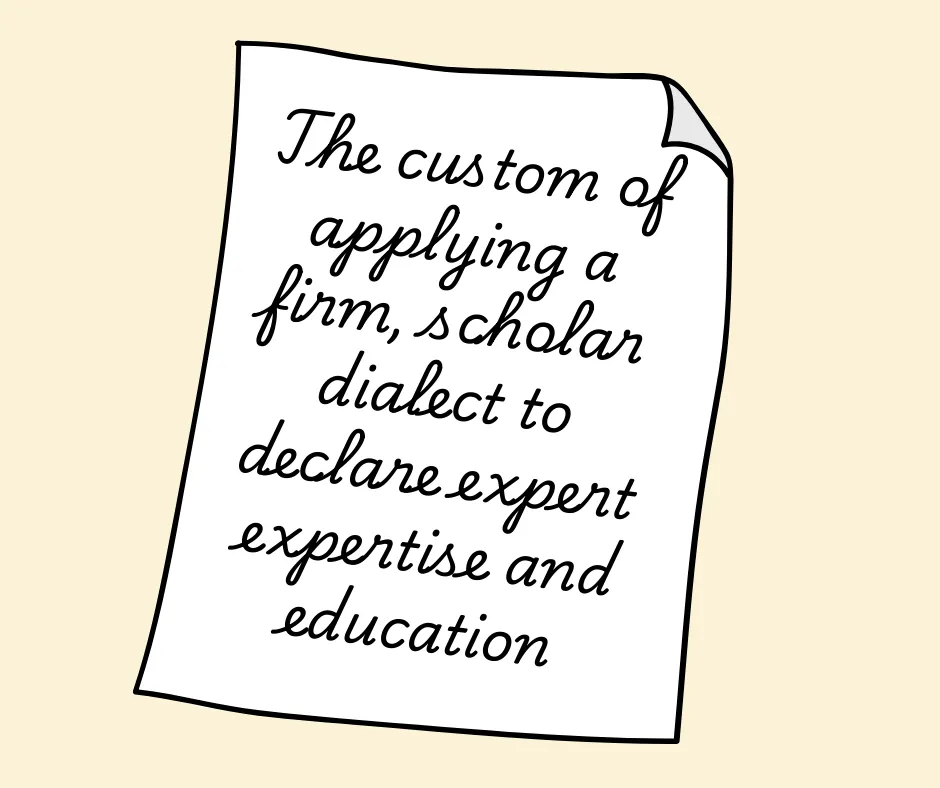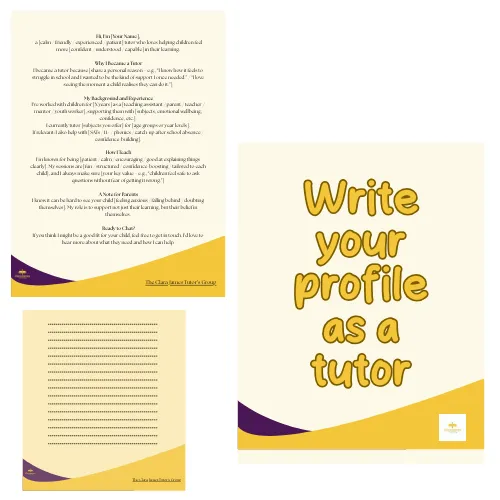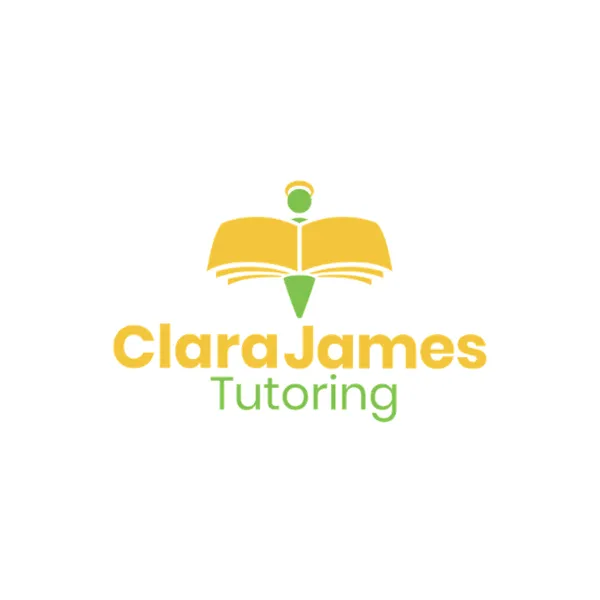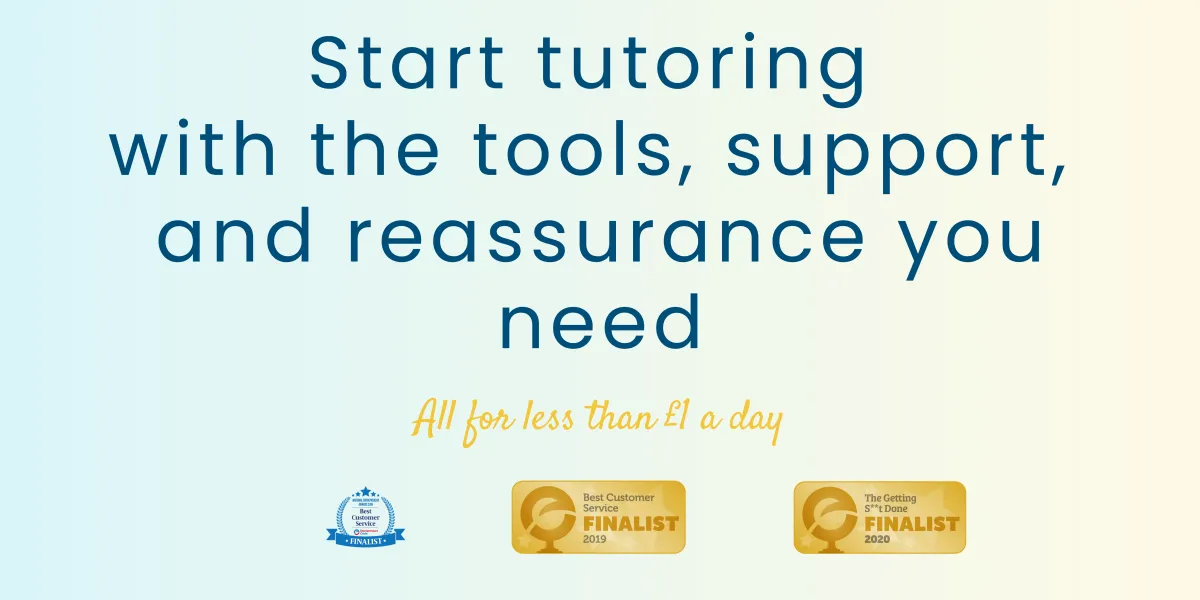
Is your profile as a tutor important? Surely as long as it states my experience and qualifications that’s what is important, the rest is just a bonus or may be even waffle…
Instead, your profile matters hugely.
Imagine walking into a room full of people. You introduce yourself: I’m Dawn, I’m a maths and English tutor.
Their response is, “oh you should meet a,b,c and d, because they’re maths and English tutors as well”.
Ok, we could add a bit more to differentiate ourselves: I’m Dawn, I’ve been a maths and English tutor for over 13 years.
This time they respond “ooh, that’s a long time! You should meet a,b,c and d, because they’re maths and English tutors as well”.
The goal of your profile is to differentiate you from everyone else. More importantly, as humans we are to some degree egocentric and almost anyone looking for a tutor will be more curious about the support you can give to them, than your credentials. The fact that you have been a teacher for x number of years is of no consequence to them if all your experience not relevant to what they are looking for.
If you'd rather watch a video version of the article click here
The common mistakes new tutors make in their tutoring profiles
1. Hiding Behind Qualifications
This is reinforced further by the profiles which rely on listing degrees, certificates, and training, but they fail to mention anything that is personal.
There is a fear that if they “don’t sound official, no one will trust me.”
But the reality is that those people looking for tutors are human. An most humans (parents or students) are drawn to warmth, reassurance, and a sense of connection. Your qualifications are part of the picture, but they want to get to know you. Are you someone that they would feel happy inviting into their lives to work with them, potentially when they are feeling vulnerable because they struggle with the subject or with learning in general.
I normally explain how I always wondered if my oldest daughter might be mildly dyslexic. When I approached her school, they dismissed dyslexia as an excuse for laziness. I didn’t have the confidence to fight my corner so I decided to learn what I could so that I could help her myself. That was probably over 20+ years ago now. I then explain the journey that has led me to tutoring.
2. Speaking Too Formally or Impersonally
Another mistake that is sometimes used is the “custom of applying a firm, scholar dialect to declare expert expertise and education”. Obviously, I have exaggerated this point.
Every word in my original sentence I formalised with the use of a thesaurus.
People believe that they need to sound impressive. But the best profiles feel human. A calm, friendly tone builds trust far more than jargon and big words do. Formality and big words can make it feel as if you are putting a barrier around you and keeping them at arm’s length.

Don't be overly formal or academic when you write your profile. The best profiles feel human.
3. Forgetting the Parent or Student's Point of View
This point seems to be the one that occurs time and time again. People talk about themselves without addressing the family’s or the student’s needs. This no doubt stems from the fear that “I don’t know how to sell myself.”
But the simple solution is not to try and sell yourself, but to instead focus on your understanding of what the family wants: someone who can help their child catch up. Someone who will help their child to regain their confidence in a subject. A tutor who will help them to bridge the gap in their knowledge. Someone who is warm, approachable and is there to help.
To reinforce this last point I will often give parents some simple pointers of things that they can do to support their child such as presenting reading as a game rather than a chore, offering rewards rather than reprimands, or sometimes it might be a simple game such as the times tables noughts-and-crosses game that we often use that they can share with their child to help them learn something in a quick, no-pressure environment. The goal is to highlight that I am here to help you. I care.
4. Not Sharing Why They Tutor
Listing experience without sharing their motivation as many people that “no one cares about my story.” But people do care, they are hugely interested.
A sentence like “I became a tutor because I know what it’s like to struggle” can be powerful. It shows heart. I normally state that my reason for starting to tutor was because a friend talked me into it and I (again) didn’t have the confidence to say no. But over the years it has opened my eyes to how many children are struggling because the school system doesn’t work for them. These days my why, my mission statement is:
To support children to achieve their (maths and English) goals in a way that works for them, to boost their confidence and knowledge and to support other tutors whose goal is to boost the confidence of those who have lost sight of their abilities because they are not taught in a way that suits them.
The first time I wrote this I cried. It wasn’t just a phrase that said that I aim to boost confidence and knowledge in maths and English. It went so much deeper. Because it meant something to me, I hoped it would resonate with other people as well.
5. Trying to Be Everything to Everyone
Many tutors when they first start have the goal of “tutoring all ages and subjects!” They are desperate for this to work and if they narrow it down, they might lose opportunities.
However, specificity builds trust. Saying “I specialise in helping Year 6 students feel confident for SATs” is more powerful than sounding broad and vague.
Sometimes the analogy of needing brain surgery is used. If that was you, I suspect you would look for a specialist rather than a general practitioner. Although this is extreme, it exemplifies the point.
I can remember back in my early days of tutoring someone saying that she could tutor most subjects. You don’t really need the subject knowledge; you just need the skill. I took this advice on board and started taking on other tutors who could support a far wider range of subjects than I could do alone. However, in doing so I was setting the business up for failure. It was only when I stepped back, reanalysed the situation and decided that maths and English were my strengths, supporting neurodiverse children was a strength, so these were where we as a company would focus. From this point on the company has gone from strength to strength and has gained an incredible reputation in the process.
6. Not Including a Clear Call to Action
So many people fear sounding pushy, so they end their profile without inviting the next step. This is creating a huge, missed opportunity. It doesn’t need to be a sales pitch, it can simply be a gentle, warm invitation along the lines of “If you have any questions or you’d like to chat about how I can support your child, please do feel free to get in touch.” A phrase such as this can make all the difference.
A breakdown of what to include (with example wording)
So, we’ve looked at what we shouldn’t do, so now we need to consider what we should include. I have attached a free download for you so that you can just fill in the blanks to create your own tutoring profile. I hope it helps.
💬 1. A Friendly Introduction
Firstly, you need to offer your name and a warm welcome such as, “Hi, I’m Sam. I’m a local tutor who loves helping children grow in confidence.”
This will help you to set the tone in a warm, reassuring, and human kind of way.
🧡 2. Why You Became a Tutor
A brief insight into your motivation e.g., “I became a tutor because I know how hard it can feel to fall behind, and how powerful it is when someone believes in you.”
Share your heart as this helps to build a connection.
Another story I occasionally share (and it’s the one I use in the introduction of my book) is how we had been doing something in maths one day and the teacher picked on me to give the answer. I had no idea, so she repeated what she had just said. I was still none the wiser. After this happened a third time, she rolled her eyes and moved on to asking someone else. I felt so stupid. But that evening dad sat down with me and using the analogy of a set of scales explained it to me. It made perfect sense. Having that someone who would take the time to speak to me as an individual, in a way that I understood, gave me confidence in myself. It made me believe that I can do it. I now want to be that person to other people.
🎓 3. Your Experience and Background
Explain your work experience, for example as a teaching assistant, classroom teaching, home schooling, parenting, or coaching.
If you have any formal qualifications mention them, but don’t worry if they’re limited. Focus on experience with children and your approach. It is your experience that often builds the bridge with the family rather than your qualifications.
I’ve never qualified as a classroom teacher. The thought of standing in front of a group of people terrifies me. But I have a degree in childcare and education, and I have spent over 20 years learning about how we can support different learning styles. Some parents are looking for a qualified teacher and that is fine, but for most parents the other information that I share, more than justifies the fact that I’m not one.

Explain why you became a tutor, what your motivation is.
Share your heart as this helps to offer a connection.
📘 4. The Subjects and Ages You Tutor
As mentioned previously you need to be specific with this: “I work mainly with children in KS2 who need support with maths and reading.” (Though you may on occasion start by working with a child in KS2 and then follow them through to the end of their GCSEs, make sure you keep your profile specific to your main goal).
You may also mention whether you help with SATs, phonics, 11+, specific exam boards of English Literature texts, if this is relevant.
✨ 5. Your Approach and Values
How do you teach and your values, what’s important to you is hugely important. It might be that you want to state how your approach is to be calm and patient and how you always make sure a child feels safe to ask questions. Or your approach may be that you offer the discipline and authority needed to ensure that the student reaches their full potential and achieves the grades that they aspire to. There is no right or wrong approach to this, just ensure that you are honest as otherwise trust will be lost from the outset.
You may also comment on how you focus on confidence-building, breaking down tricky topics into small relatable steps. Maybe your speciality is in helping anxious learners.
I have a couple of maths tutors who work with me. Both are amazing, yet both are very different. Henry is a civil servant and will work with you through a worksheet at your pace breaking the question down and supporting you as figure out how to solve it.
The other, Neil, is a retired British Airways engineer. He again breaks everything down, but his method is to relate it back to the real world. So, he looks at the importance of triangles in building bridges (through getting you to build bridges out of cardboard and Sellotape). Then once you can see why triangles are so important, he will then work through Pythagoras and trigonometry with you because you can see its relevance.
Both have aspects which are quite similar, yet at the same time, they are both very different in their approach.
👪 6. Reassurance for Parents
Show you understand their worries, if you have a personal anecdote to share, do show. It again reinforces that you are human, but not just that it shows that you can empathise. It maybe you, your child, a child that you have worked with. Stating that you know how upsetting it is when a child says they’re ‘rubbish at maths’. Let them know that you will do everything you (realistically) can to help.
Offer them calm reassurance that progress is possible. Rome wasn’t built in a day but if you can help them to boost their child’s confidence, from there comes a willingness to participate which leads to improvement which leads to confidence and it becomes a spiral of success.
📞 7. A Gentle Invitation to Get in Touch
End by offering them an easy next step such as “If you think I might be a good fit for your child, feel free to get in touch, I’d love to help or answer any questions that you might have”.
📜 Should you mention qualifications? What if you don’t have any?
Yes, include any relevant qualifications especially if they relate to teaching, childcare, or your subject area. But don’t worry if you don’t have formal teaching qualifications many brilliant tutors come from other backgrounds such as teaching assistants, parents, or those changing their career.
Focus on your experience with children and your approach to supporting learning. Mention things like DBS checks, training you've done, or personal experience helping children at home or in schools. Parents want someone kind, patient, and capable, this isn’t necessarily someone with a string of certificates or an catalogue of theoretical knowledge.
💬What kind of tone works best?
Aim for a calm, warm, and friendly tone like how you’d speak to a parent over a cup of tea.
Avoid being too formal or overly academic; you don’t need to “sound impressive” it’s more important to sound genuine. Let your personality come through, it helps families feel a connection with you. Use language that is clear, yet gentle, language that reassures and invites trust.
Imagine if you were a parent who’s feeling anxious and uncertain, how would you want to be spoken to. Put yourself in their shoes and reassure them that together you can do the best for their child.
So, What comes next?
Download The Template
Here is the template to download,. Just “fill-in-the-blanks" to create your tutor profile, written in a warm, approachable tone that mirrors the kind of connection parents and students are often seeking.
I hope you find it helpful.

Copywrite: Clara James Tutoring 2025


